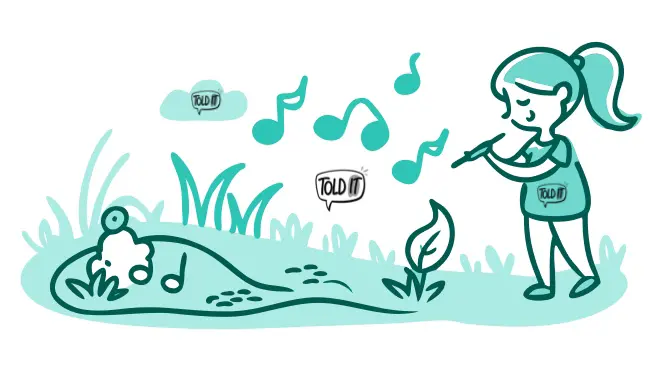The Twilight Hour
Evening had not yet fallen.
The twilight’s colorful glow spread enchantment across the sky and over the earth.
The herders were driving their cows and goats home; they were returning joyfully.
Sumita stood facing the opposite direction from where the herds were coming — meaning, the cattle and goats of the village were rushing straight toward her.
She wore a faded, thin sari made of towel-cloth. The glow of dusk streamed across her graceful body.
Rumors and Resolve
There were three or four herders in the group. The one she needed to see was Suman.
She had noticed over the past few days that whenever she went to the fields to collect cow dung, Suman’s flute would begin to play.
Rumors had spread through the village — they said the two were in love.
After all, both of their names began with “Su.”
Sumita didn’t know who had started the gossip, but she was determined to put an end to it.
That Suman’s flute played whenever she appeared — that was no mistake.
The villagers were wrong to defame her, but the sound of the flute was real.
She had to break this truth apart — she had to confront Suman, to settle this once and for all.
Why should he play the flute at the sight of her? He owed her an answer.
She would not let her name be tarnished.
The Confrontation
A cloud of dust rose as the cattle and goats galloped home, tails flicking, bursting with unrestrained joy.
Their happiness mingled with Sumita’s own strange excitement — another day’s herding was done.
The herders were returning, bare-chested, towels tied around their waists.
Suman — how old could he be? Well, this year he’d become a registered voter —
so he must be eighteen.
Sumita wasn’t old enough to vote yet.
She waited behind a palm tree. Fortune favored her — Suman was walking at the very end, slowly.
As he came closer, Sumita stepped out from behind the tree and said,
“Hey Suman, I need a word with you.”
Suman’s bare chest was dust-covered, his towel knotted at the waist, the flute tucked in.
In his hand, a three-hand-long cane for prodding the animals.
He faltered for a moment and asked, “Are you going home?”
Sumita said, “No, I’ll say it here.”
Suman replied, “Then say it — what is it?”
Sumita said, “Why do you play the flute when you see me?
People in the village are talking nonsense — they say you and I are in love.
Do you want to ruin my name?”
Suman stared at the ground for a while. Then he said quietly,
“I play the flute when I see you — don’t you like it?”
Sumita replied, “I don’t want this bad name.
Are you and I in love?”
Suman said, “No.”
“Then why do you play the flute?” she demanded.
“I won’t anymore,” he said.
The Silence and the Tune Within
A few days later, after dusk, Suman’s flute began to play again.
Once more, the village buzzed with gossip.
Sumita scolded him again, told him not to play.
In anger and sorrow, Suman snapped the flute in front of her.
Sumita understood then — he would never play again.
But within a few days, she realized something new — a flute was playing inside her own chest.
The more she tried to shake it off, the more its tune and shimmer chased her everywhere.
The New Song
One day, while collecting cow dung, she went to Suman.
She said, “Even if you won’t play the flute, can’t you at least sing?”
Suman said nothing.
After a while, Sumita turned to leave for the village.
Then she heard it — Suman’s flute again.
He had bought a new one.
And now, Sumita no longer feared gossip.
There was such happiness hidden in being loved by someone who played the flute for her.
She would never drive that happiness away — never again.





